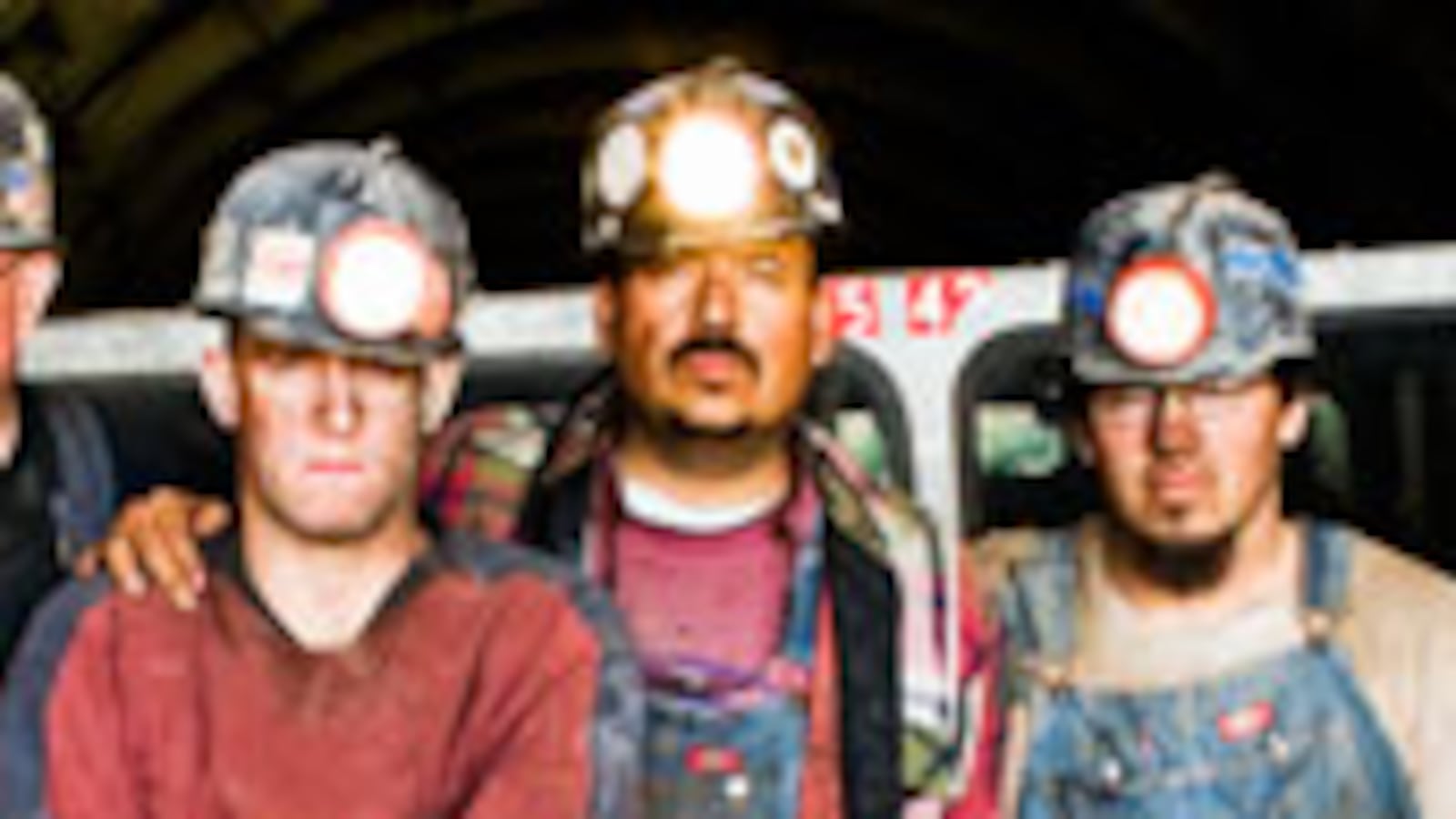
“Kill one a day and they don’t give a shit, just don’t kill two or three at a time,” said Foot, a coal miner I know. It’s crazy, he said, like, one coal miner gets crushed and maybe it makes the local paper, but a few get buried and suddenly it’s a worldwide media sensation. (Another bunch of dumb blonde newscasters on the TV saying stupid stuff and looking upset.) What is with you people? That’s what coal miners think of all of us staring at them like zoo animals whenever there’s coal miner news, which, let’s face it, is only when there’s a big, horrific accident like the massive blast last Monday at the Upper Big Branch mine in West Virginia that killed 25. Do people not realize what coal miners do? Do people not realize that coal miners live with this crap every day?
Every ride back up the elevator is a testament to who you are. One of the lucky ones. Jesus H. Christ, you’re alive.
At the Hopedale mine, in eastern Ohio, the elevator plunged without ceremony 500 feet into the earth and then we all laid flat in a little car, a “mantrip,” that clattered and clunked along into the tunnel of coal, a half hour in, a couple of miles in and away from the shaft. The darkness was complete, total, utter, until a pinpoint of light from a hardhat reminded you of life, of people, and how much you loved both. This was our everyday commute to work, for me just for a few months while I researched their world, for the crew 10 hours a day, six days a week.
Foot, Hook, Smitty, Pap, all the guys had stories of guys dying. “Yeah, Sammy got covered up,” was the way they casually referred to it. Or, “When did Jimmy get crushed? Was that two years ago or three now?” Dying is sad, of course, but, well, hello? Dying is the inevitable outcome of living. In a coal mine you constantly realize things like that.
People say, “Oh, how do they mentally prepare for the danger?” Or, “How do they learn to cope with the death of their brethren?” to which a coal miner will reply, “Jesus H. Christ, get over yourself.” Coal miners are busy, constantly moving, each crew a choreography advancing into the coal, chewing it with their machines, scooping it, hauling it in frantic little buggies. You watch “the top,” or roof, above the guy in front of you and he watches the top in front of him, and everyone worries every minute about it caving in. Yeah, pretty much every minute. You check your methane detector to find out what the earth is bleeding and how much actual air there is to breathe and you know that the slightest, smallest spark, metal against metal, can mean—fwoom!—the end. Each scoop of coal is a reach into the unknown, a place no human has ever been, like the moon, like Mars, and so anything can happen. Anything. You think about your safety and the safety of your crew—every minute of every shift—you really do, and you don’t curse the boss, or the union, or the company with all their safety laws, you don’t think any of the rules are bullshit because you know every law is written in blood. A guy died, or a guy got his leg chopped off, and that’s why there’s the law.
And listen, every time a person above ground flips a light switch he burns a lump of coal. So yeah, we need people in coal mines digging coal. And stop with the pity party. These guys haven’t been sentenced to the coal mines. They have chosen this life. And stop with the romance. They don’t love coal mining. They hate coal mining. You try it. The Hopedale mine was five feet high inside, meaning that none of the guys could actually stand up. You try working your whole day doing a duck walk. Pap can tell you about working in a 36-inch coal seam, crawling on his belly, putting roof bolts in so the thing wouldn’t collapse, every day for years.
Nor is coal mining some cultural expression of some family values bullshit— oh, I’m walking in my daddy’s footsteps so my fat wife can weep along with the country music songs piped in up at the Super Wal-Mart. No. Just… no. And it is most certainly not about some dopey urge to play the hero and fuel America. There is no ego in coal mining, or at least not that kind. Coal mining is a damn good paying job—60, 70, 80 grand a year—that “just sorta sticks to you after a while,” as Scotty put it. “You keep surviving shit and pretty soon that’s just who you are.” A survivor. It keeps you going down for more. It’s a high. Every ride back up the elevator is a testament to who you are. One of the lucky ones. Jesus H. Christ, you’re alive. You take the metal tag with your name on it off the pegboard, glance at the tags sill hanging. Those guys are still down there. You go to the bathhouse, strip naked, and soak.
Jeanne Marie Laskas is the author of five books, including her newest, Growing Girls (Bantam Dell, 2006), the award-winning The Exact Same Moon (Bantam Dell, 2003), and Fifty Acres and a Poodle (Bantam Dell, 2000). A professor in the creative writing program at the University of Pittsburgh, she lives with her husband and two daughters at Sweetwater Farm in Scenery Hill, Pennsylvania.





